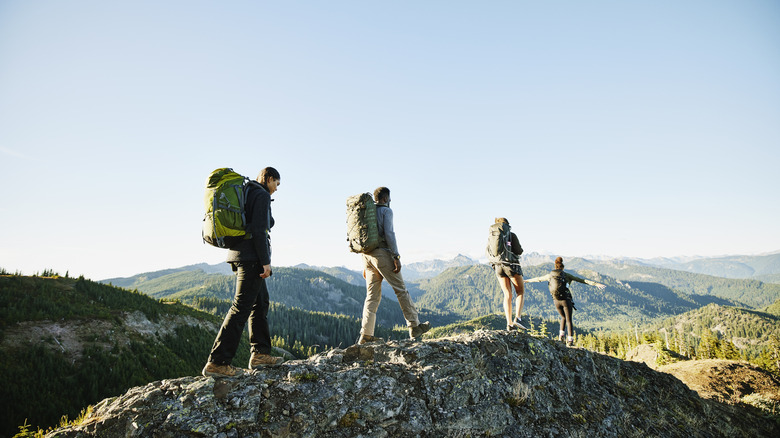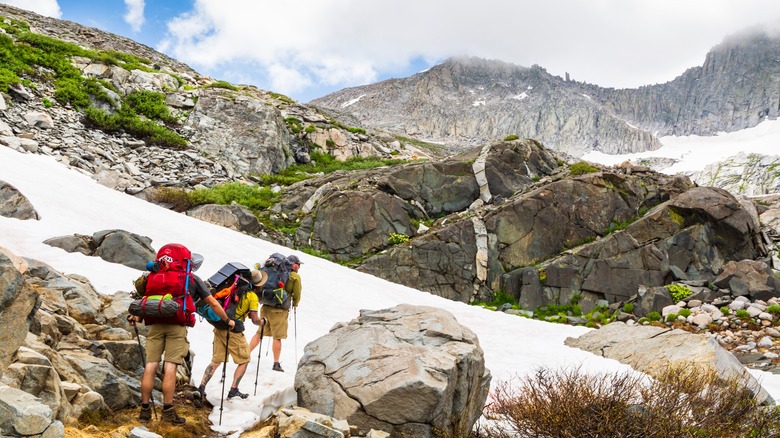Backpacking Vs Thru-Hiking: What's The Difference & Which Is Right For You?
Getting out onto a trail and hiking is an amazing way to de-stress and reconnect with nature, and this is especially true when you decide to spend multiple days in the wilderness walking trails during the day and camping at night. However, if you are new to backpacking, you may not know that there is a bit of a debate in the hiking community about the differences between backpacking and thru-hiking. As a long-time hiking enthusiast and backpacker who has completed multi-day treks around the world including — most recently — the eight-day Annapurna base camp and the 13-day Manaslu circuit treks in Nepal, I decided to tackle this debate head-on.
In general, most people consider backpacking to be the umbrella term for heading out into the wilderness with a backpack filled with supplies for a multi-day hike, and they consider thru-hiking to be a specific type of backpacking that focuses more on distance and speed. In my opinion, the difference between the two also has to do with mindset and goals. The goal for backpackers tends to be to spend time enjoying nature and taking in the scenery with more focus on the journey. For thru-hikers, there is more emphasis covering as much ground as possible to reach a particular destination in a short time with less emphasis on stopping to smell the flowers.
While you don't have to really decide whether or not you are a backpacker or thru-hiker (you can be both, neither, or somewhere in between), knowing which one you are more inclined towards can help you better choose your trails, set goals, and buy the right gear. So, let's talk about it.
Trail differences in backpacking and thru-hiking
While many trails can be used for both thru-hiking and backpacking, in general, thru-hiking tends to deal with longer distance trails. Some of the most well-known thru-hiking trails in the United States include the Appalachian Trail (2,198 miles) and the Pacific Crest Trail (2,650 miles). Because these trails are particularly long, they are usually thru-hiked with a focus on covering as many miles as possible each day. However, thru-hiking doesn't have to take months and there are many thru-hiking trails that can be completed in two weeks or less and some that can even be completed in one day. The only real requirement for thru-hiking is a focus on covering a specific trail from beginning to end in one attempt.
Backpackers, on the other hand, tend to see the journey a little differently and have more of a focus on just spending time out in nature instead of reaching an end point at a specific time. Backpackers may even go off trail or take another route if it looks like it will be more interesting than the one they are on. They may also focus more on where they set up camp and spend more time cooking, chatting, and relaxing around the fire or at scenic viewpoints. In general, backpacking is less about getting from point A to point B and more about enjoying the ride.
Because of these differences, trails chosen for thru-hiking tend to be more developed and have better access to essentials like water and resupply points, whereas backpacking trails may be further out in the wilderness with less access to essential resources, meaning that you have to carry more with you.
Gear differences in backpacking and thru-hiking
Because backpacking and thru-hiking tend to have different goals, they also have different gear requirements. In general, if you pack more like Samwise Gamgee from "The Lord of the Rings" when you go hiking, you are probably a backpacker, but if you tend to pack more like Legolas (essentials only) then you are likely a thru-hiker.
This is because thru-hikers have to travel long distances quickly and, therefore, have more of a focus on keeping things light. This means maybe choosing to wear trail runners instead of heavy hiking boots and, when it comes to choosing the right backpack for a hike, going with something that has less support but is lightweight as opposed to something that has a sturdier frame but is heavier. Thru-hikers tend to also focus on only bringing essentials so they aren't weighed down by heavy packs and can move more nimbly along the path.
Backpackers, on the other hand, are more likely to carry heavier packs with more gear and things they want to use at camp or along the way. Backpackers also tend to live a little more luxuriously at camp and may bring items that thru-hikers would eliminate, like binoculars for birdwatching, that small (but somehow still heavy) travel espresso machine, multiple pots and pans, and whatever else they enjoy without making their packs impossible to carry. The best thing about this debate of whether you are a thru-hiker or a backpacker is that it's very personal and completely up to you because — as many trekkers will say — you have to hike your own hike.


